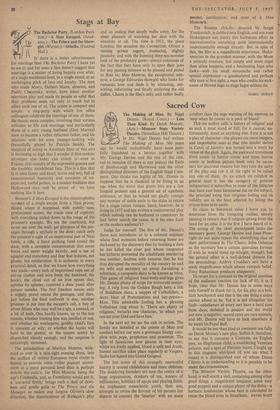Sacred Cow
The Making of Moo. By Nigel Dennis. (Royal Court.) — Less Than Kind. By Derek Monsey.
(Arts.)—Moscow State Variety Theatre. (Streatham Hill Theatre.) IF Mr. Nigel Dennis had written The Making of Moo 500 years
ago he would undoubtedly have been pain- fully liquidated as a heretic together with Mr. George Devine and the rest of the cast, not to mention (if there is any justice) the Earls of Bessborough and Harewood and the other distinguished directors of the English Stage Com- pany. One thinks too highly of Mr. Dennis to suppose that he is thankful to be living in an age when the worst that greets him are a few languid protests and a general air of apathetic tolerance, or that he would not gladly consign any number of noble earls to the stake in return for a single rotten tomato. Since, however, he is living in 1957 and has written a controversial play which nobody can be bothered to controvert he had better search the cause. Is it his own fault or the modern audience's?
Judge for yourself. The first of Mr. Dennis's three acts introduces us to a colonial engineer whose final moments before returning home are darkened by the discovery that by building a dam he has killed the river god whose vengeance has hitherto prevented the inhabitants murdering one another. Smitten with remorse that he has thus disrupted the morality of the country he and his wife and secretary set about furnishing a substitute, a composite deity to be known as Moo. This game of religious head-body-and-legs gives Mr. Dennis plenty of scope for irreverent conjur- ing. A twig from the Golden Bough here, a lick of Buddhism there, a snippet of CatholiCism, a short blast of Protestantism and hey-presto- Moo. This admirable fooling has a pleasing Voltairean ring about it. 'There are plenty of religions,' remarks one character, 'in which you can eat your God and have him.'
In the next act we see the cult in action. The family are installed as the priests of Moo and conduct before our eyes a grotesque liturgy com- plete with pope, prophetess and precentor. The light of fanaticism now gleams in their eyes; whips are freely applied, blood is spilt and drunk, human sacrifice takes place regularly at Vespers. Satire has lapsed into Grand Guignol.
The last scene of this strangely uneventful history is second childishness and mere oblivion. The doddering founders are now the centre of a huge organisation, drinkers of tea, wooers of millionaires, babblers of agape and playing fields. An unpleasant masochistic youth, their son, attempts to revive the fervour of his parents but departs to convert the 'interior' with no more
comfort than the sage warning of his mamma to 'stop when he comes to a pool of blood.'
This the author calls 'a history of religion' and as such it must stand or fall; for it cannot, un- fortunately, stand as anything else. First it is not
a play of character—the players are mere integers, and improbable ones at that (the similar defect in Cards of Identity was turned into a merit by virtue of the plot). Again, the awkward transitions
from comic to horror comic and from horror comic to bedtime picture book may be neces- sary for doctrinal reasons but they ruin the unity of the play and rob it of the right to be called any one of them. As an attack on religion in general (and it has the savagery of genuine indignation) it subscribes to most of the fallacies that have ever been hammered out on the subject, the principal being that religious feeling and its validity are in the least affected by listing the crimes done in its name.
Its claim to historical value I leave you to determine from the foregoing outline, merely pausing to remark that if religion sprang from the need for an ethic it is the first I have heard of it. The acting of the chief participants lacks the necessary gusto. George Devine and Joan Plow-
right do not quite repeat the electrifying élan of their performance in The Chairs. John Osborne
as the secretary has a certain querulous fervour (I wish he would stand up straight, though), but the general effect is a well-defined distaste for the proceedings. Audrey Cruddas's sets have a seedy magnificence which almost compels belief. Tony Richardson produces adequately.
To revert for a moment to the original question of the audience reaction (or lack of it); it is, I hope, clear that Mr. Dennis has in some ways only himself to thank for it, for his play is a bril- liant hotchpotch and that is the one thing a satire cannot afford to be. Yet it is not altogether his fault—unbelievers of every sort have a hard time these days; disbelief is positive and the world just now is negative; sacred cows are rare animals, and Mr. Dennis will have to look elsewhere if he wants his Papal Bull.
It would be less than kind to comment too fully on Derek Monsey's new play. Suffice it, therefore, to say that it concerns a Contessa, an English peer, an illegitimate child, a mouldering Venetian palazzo, and a spot of Platonic incest. Caught up in this stagnant whirlpool (if you see what I mean) is a distinguished cast of whom Diane Cilento is as understanding as it is possible to be under the circumstances.
The Moscow Variety Theatre, on the other hand, is well worth a visit, containing among other good things a magnificent conjuror, some very good puppets and a unique player of the doira—a barbaric tambourine whose beat is calculated to rouse the blood even in Streatham. DAVID WATT














































 Previous page
Previous page